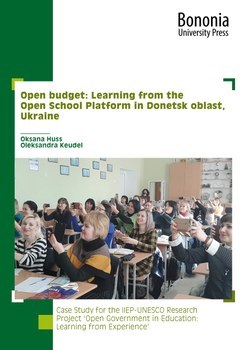New publication on transparency in the education sector brings lessons from Ukraine
The publication was launched by Bononia University Press and is an open-source volum
Published on 01 October 2021

In the recently launched publication Open budget: Learning from the Open School Platform in Donetsk oblast, Ukraine, Oksana Huss, who is a research fellow at the BIT-ACT project, and Oleksandra Keudel analyse how the open government approach is being applied in Ukraine. Their analysis focus on how the country is trying to resolve the critical issue of non‐transparent school financing through parents’ donations that undermines trust among key educational stakeholders.
The study is part of the Unesco International Institute for Educational Planning (IIEP-UNESCO) research project named “Open Government in Education: Learning from Experience”.
The publication was launched by Bononia University Press and is an open-source volume. It details the case of Open School (OS) Platform, an online tool developed in 2016 to allow parents in the Ukrainian region of Donetsk oblast to visualise the school’s budget, needs and expenditures in an easy‐to‐read format.
Huss and Keudel’s work shows that OS has contributed to improve trust among key stakeholders, to improve communication and collaboration between school personnel and local public authorities, and also to promote more effective planning. The study also confirms that the use of information and communications technologies can lead to inequalities in poor rural communities having low levels of Internet access or computer literacy.
The study concludes on the importance of open government for shifting to a new paradigm of cooperation and partnership. The authors recommend providing access to information in line with the Open Data Charter; ensuring a legal framework for citizen participation; using handy and accessible technological solutions, and following a “learning‐by‐doing” approach to build up social capital for constructive interaction with authorities.